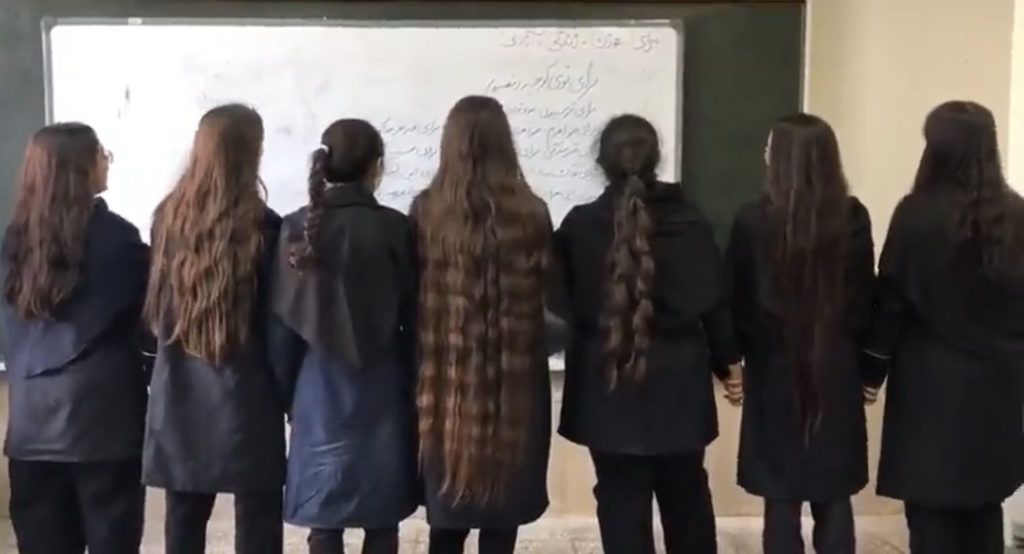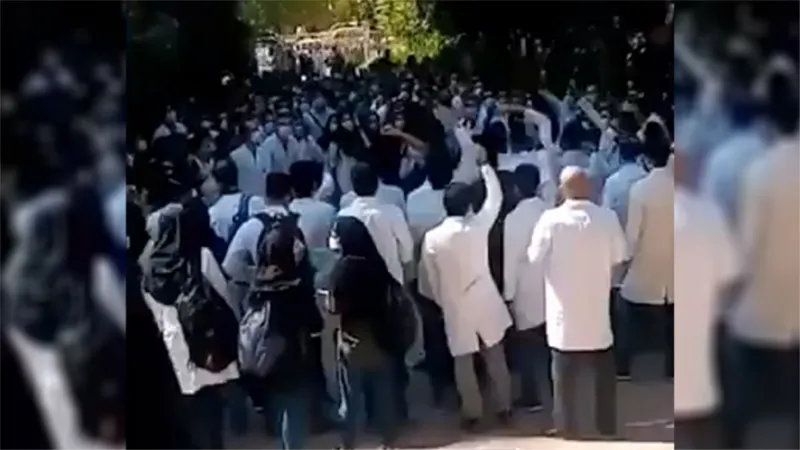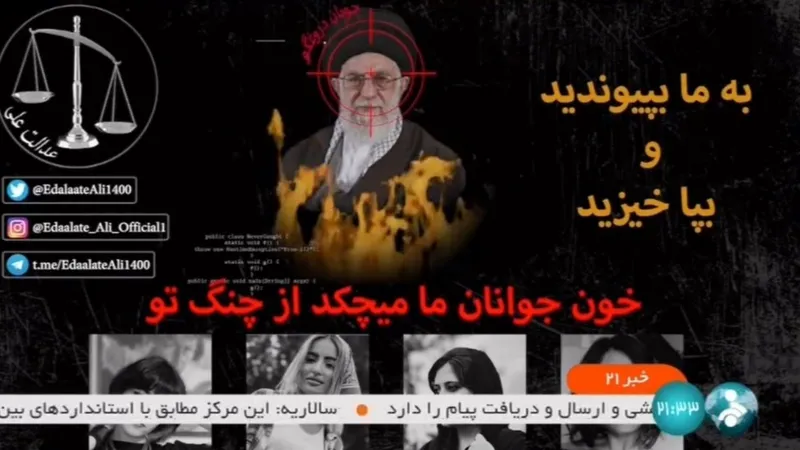
Holding a Survey Regarding Kayhan Daily’s Claim That a High Percentage of the Public Support the 1979 Revolution
The editorial of Setareh Sobh calls out the claim of the pro-Iranian government newspaper Kayhan that the majority of Iranian society back the Iranian political system and the 1979 revolution, suggesting that they should conduct a survey to verify this.
Mahsa Amini was detained by the Iranian morality police and died three days later in hospital. Protests over her death initially started in the western cities of Saghez and Sanandaj, and later Tehran University students reacted to her death. Since then, protests have erupted all over the country with people chanting radical anti-government slogans such as “Death to the dictator” and “Death to Khamenei.”
According to the Iranian authorities and eyewitnesses, young people under the age of 20 have taken to the streets in the past weeks since the protests started. What is important from a sociological viewpoint is that middle-aged and elderly people have not been significantly present in these protests.
Many of those who took to the streets during the 1979 revolution, as a matter of fact, are now dead. As for middle-aged people, they are either critical of the situation or have become indifferent to political issues.
Many university and high school students are in the frontlines of the protests over the death of Amini. Now, despite widespread discontent in society, Kayhan daily has claimed that the “Overwhelming majority of Iranian society support the Islamic Revolution; those who are against the Islamic Revolution are in a minority – perhaps 99 percent to 1 percent!”
This claim must be verified through holding a survey to make it clear what percentage of Iranian people are for or against the 1979 revolution.
Some people are pretending to be asleep while the fact is that a society where almost everyone has access to the internet and do not want to live like in the past. In the past 43 years, Iranian society has changed and now has different demands.
The fact is that today’s younger generation wants to live a good life and have hope for the future. The project of conformity within society has failed because Iranian society is diverse and people are now aware of their rights.
Danger of Nuclear War
The editorial of Arman Melli sheds light on the duality in Iran’s policies, in which there is no consistency between what the Iranian military does and what the Iranian authorities say.
Joe Biden has recently warned against a nuclear “Armageddon” saying that the risk is now the highest in the past 50 years. Under the current circumstances, the Russians will never give back the eastern part of Ukraine which they have occupied. It seems that Putin’s nuclear threat is mostly directed at Europe and the United States so that they do not help Ukraine anymore, though they will continue to do so.
The Russia-Ukraine war, however, has come to a deadlock. The Russians have fully occupied that region, and although the Ukrainians are pressuring them, currently they are not powerful enough to take that region back. So, Putin’s objective is to pressure the West to make them stop helping Ukraine.
Amid all these issues, Iran’s stance toward the war in Ukraine shows inconsistency. While the Iranian Foreign Ministry denies supplying arms to the Russians, the United States says otherwise and the Ukrainians claim to have shot down Iranian drones.
In reaction to this duality in Iran’s policy, Ukraine has expelled Iranian students and might take other measures. Currently, the Iranian military is doing one thing, while politicians are saying something else.
In all countries, politicians and the military take a united stance and act accordingly, and if any military measure is to be taken, then politicians justify it. On the one hand, Iran alleges to be neutral in the Russia-Ukraine war and is ready to act as a mediator, and on the other hand, the Russians are reportedly deploying Iranian drones in this war.
In fact, the military’s objectives are not necessarily the same as those of politicians. According to the Iranian Constitution, it is up to Iran’s Supreme Council for National Security to do so.
Verifying Unemployment Statistics
The editorial of Kasb-o-kar news explains that the unemployment figures released by the Iranian government cannot be properly verified.
The main government policies to reduce the unemployment rate have not been fully implemented yet. Also, because the Labor Ministry has not had a minister in the past months and has been run by an acting manager, employment policies have not been consolidated.
So, the recently announced employment statistics do not reflect the situation fully. The statistics offered by the Social Security Organization are probably different from those announced by the Labor Ministry and are inconsistent with what the Statistics Center says. Statistics must be consolidated so that we can better verify the rate of employment and unemployment.
The working population in Iran has not grown in proportion to the rate of population growth and other existing circumstances. When the working population is not properly calculated, the rate of unemployment and employment cannot be correctly measured. Despite the existing problems, the working population must increase due to the economic problems that exist in the country.
The other important issue is that of Afghan immigrants who occupy a large part of the country’s labor market, and are employed officially in Iran. It has been estimated that approximately 2 million jobs in Iran are taken by foreign workers , mainly Afghans.
When the rate of unemployment in Iran is in double digits and the labor market cannot absorb those who are looking for a job, then it makes no sense to have so many foreign workers employed in the country. Priority must be given to employing Iranian workers. Furthermore, unemployment, rising costs, and many social and economic irregularities in the country make this essential.
There is no proper investment in the employment field. The youth must feel that they belong to the country and move the country toward production and development. This needs cultural activities. The youth need to have proper training which apparently is not a priority.
Cheering for Dollars That Have Not Come to the Country Yet
The editorial of Jahan Sanat poses questions about Iranian officials’ excessive enthusiasm over claims that some of Iran’s blocked foreign currency will soon be released. No information about when, where, how much money will be released has been given, yet the Iranian authorities are over the moon about this.
In the 2000s, Iran had $70 billion worth of revenues from exporting crude oil on average each year. But in in 2012 and 2013, Iran’s economic growth was minus 8 percent and the price of the dollar tripled from 1,100 tomans to 3,000 tomans.
So, it can be proved that Iran’s economic problems in recent years are not just due to a decrease in oil revenues. But this decrease has created many problems for Iranian businesses, adding to the existing problems. Iran’s economy is facing tough challenges because of the government’s anti-West foreign policy, falling into a trap from which it will not be freed soon.
Now under these circumstances, it is shocking to see Iran’s economic and political managers so excitedly talk of the possible release of an unclear amount of the country’s blocked money in some unknown future.
The Central Bank governor talks as if he has performed a miracle. Some Iranian media outlets talk so triumphantly about a victory about which nothing is clear or known as if it is the biggest victory of all times. Moreover, it is not clear what the Iranian authorities have conceded to give in exchange.
In a world where an Indian or South Korean company, for example, exports up to $40 billion per year, it is frustrating to see that Iran’s economic authorities try to create confidence in the country’s market by simply talking about releasing Iran’s currency resources, hoping to prevent a rise in the price of the dollar in the market which has increased to more than 35,000 tomans per dollar.
If Iran was not under sanctions, if normal economic activity had continued, if the growth in oil exports had been the same as from 1966 to 1976, and if the country had used its natural gas resources as much as Qatar, then it would not be necessary to cheer so much over such an uncertain issue.
Such happiness for forex that has not even come into the country will be a signal to those that have put sanctions on Iran about how much the Iranian government is under pressure.

Extensive, Severe Crackdown on City of Sanandaj; Oil Workers in Abadan Launch Strike

Several human rights organizations have warned about the extent and the severity of the crackdown on the Kurdish city of Sanandaj which has become the center of the protests against the Iranian government in western Iran, expressing concern over the use of semi-heavy military weapons in this city.
Three weeks after the beginning of nationwide protests in Iran, popular protests in Sanandaj have heightened and human rights organizations have even accused Iranian government forces of “bombing” certain neighborhoods in this city.
According to the human rights organization Hengaw, a full military attack was waged against Sanandaj, while this city’s citizens are facing restrictions on accessing the internet. This organization states that the documents that they have received prove the use of banned weapons of war against ordinary people in Sanandaj by Iranian government forces.
Furthermore, Kurdistan Human Rights Network has stated that so far 30 Kurdish citizens including five children have been killed in different cities because of the shootings of anti-riot and Basiji forces.
In the meantime, after the oil workers’ strikes in southern Iran, workers at the Abadan Oil Refinery also joined the strikes on Tuesday and held an assembly in front of the refinery facilities.
Workers at Bushehr Petrochemical Company launched a strike on Monday despite the presence of security forces, and chanted “Death to the dictator.” Strikes were also launched at other petrochemical facilities.
Along with widespread strikes, street protests have continued, and a group called Youths from Tehran’s Neighborhoods have called for holding assemblies on Wednesday. They have asked people to take to the streets in support of the people in Sanandaj and Zahedan, asserting that if this wave of uprising subsides, “the criminal regime” will ignore the laws and disregard the protesters.
So far, the United States, Canada and the UK have imposed sanctions against the Iranian government for its crackdown on the people and the EU will impose similar sanctions on Iran next week.
Security Forces Attack Schools

Less than a week after Iranian Supreme Leader Ali Khamenei authorized the use of violence against children, security forces extensively raided girls’ schools and detained a number of students. Some parents announced on social media that their children were expelled from school for taking part in the protests.
Widespread public protests triggered by the death of Mahsa Amini in morality police custody in Tehran found new dimensions when Iranian high school students joined them. In recent days, a large number of schoolgirls, both in and out of schools, have taken off their headscarves and chanted slogans against the Iranian establishment.
There have also been reports of security forces raiding schools and arresting students randomly.
In addition, school principals have reportedly threatened to expel students and hand them over to security forces, while some school administrators have refused to cooperate with security forces in spite of facing pressure and threats.
In the recent protests, Iran’s Revolutionary Guard Corps (IRGC) forces arrested many children, as Ali Fadavi, the second highest commander in the IRGC, openly admitted that the average age of those arrested is 15. Human rights organizations have reported that at least 28 individuals killed in the protests were under the age of 18.
Now, violent attacks on schools, arresting students and threatening them prove that the Iranian government will take any measures for its own survival including violence against children in defiance of international law, and even in his speech, Ali Khamenei gave direct orders for violently confronting children.
Social media users and children’s rights activists have asked UNICEF to immediately demand that the Iranian government halt its violence against children.
The Association for Protecting Children and Adolescents issued a statement calling for the Iranian government to recognize children’s right to be protected, urging that the Iranian government must be held accountable for child abuse in general and in the recent unrest in particular.
Medical Community Criticizes Security Forces: Do Not Enter Hospitals!

A number of members of Iran’s medical community have issued their third statement in reaction to the recent protests in Iran, calling for a change in the behavior of security forces and asking them not to enter hospitals. In their statement, they have denounced the “forceful confrontation” with the people as “betraying the country.”
The third statement was issued after Iranian security forces entered one of Tehran’s hospitals for “transporting one of the physicians hospitalized in the CCU.”
The signatories of the statement have called for recognizing the right to peaceful protests, saying, “in addition to a change in behavior, detained students must be immediately released, and amends must be made with them. Also, the right to protest in academic places must be recognized and implemented.”
The statement reads, “Forceful confrontation with the people is not only not useless, it also increases frustration and hopelessness among people and youths which will increase the number of migrations from the country – which in a way is betraying the country.”
The statement also underscores the necessity of ensuring that the injured can go to hospitals and treatment centers without the fear of arrest by security forces.
Another part of the statement addresses the recent attack against Sharif University, saying that there have been clashes between security forces and students in Sharif University, which for years has been one of the most prominent scientific centers in Iran. These clashes, the statement adds, could have been prevented.
In previous protests, human rights organizations had reported on security forces creating a repressive atmosphere in hospitals and arresting those who had gone to hospital after being injured in protests.
Iran’s Human Rights Organization, located in Norway, has reported that at least 185 people have been killed so far in these protests and possibly 19 of them were children.
Iranian State-run TV Hacked; “Woman, Life, Freedom” Slogan Aired Amid Khamenei’s Speech

Iran’s state-run news network was hacked for some moments, and instead of broadcasting Iranian Supreme Leader Ali Khamenei’s images and speech, the slogan of “Woman, Life, Freedom” was aired.
It took place on Saturday night as protests were held throughout the day in different cities and continued through the night.
A group of hackers called Ali’s Justice claimed responsibility for hacking the Iranian state-run television network IRIB.
During the time that the Iranian news network was hacked, in addition to the slogan of “Woman, Life, Freedom,” the burning of the image of Ali Khamenei was aired with the words “Lying Shepherd” emblazoned across it.
Under the image of the Iranian supreme leader was written, “The blood of our youth is dripping from your hands!”
There were also images of those who had been killed by Iranian security forces in the recent protests over the death of Mahsa Amini in morality police custody.
The hackers then asked the Iranian people to join them in protesting against the government.
This is not the first time that the IRIB has been hacked. The IRIB is accused of biased news coverage, spreading government propaganda, and censoring news in favor of the government.
The IRIB has never objectively reported on the protests, and just like the Iranian authorities, has called the popular protesters “rioters.”
The IRIB is one of the most important entities under the aegis of Ali Khamenei.
An Iranian official said that the disruption of Ali Khamenei’s speech was not a hack, but “sabotage and infiltration” from within the IRIB itself, condemning this incident as “really shameful.”
